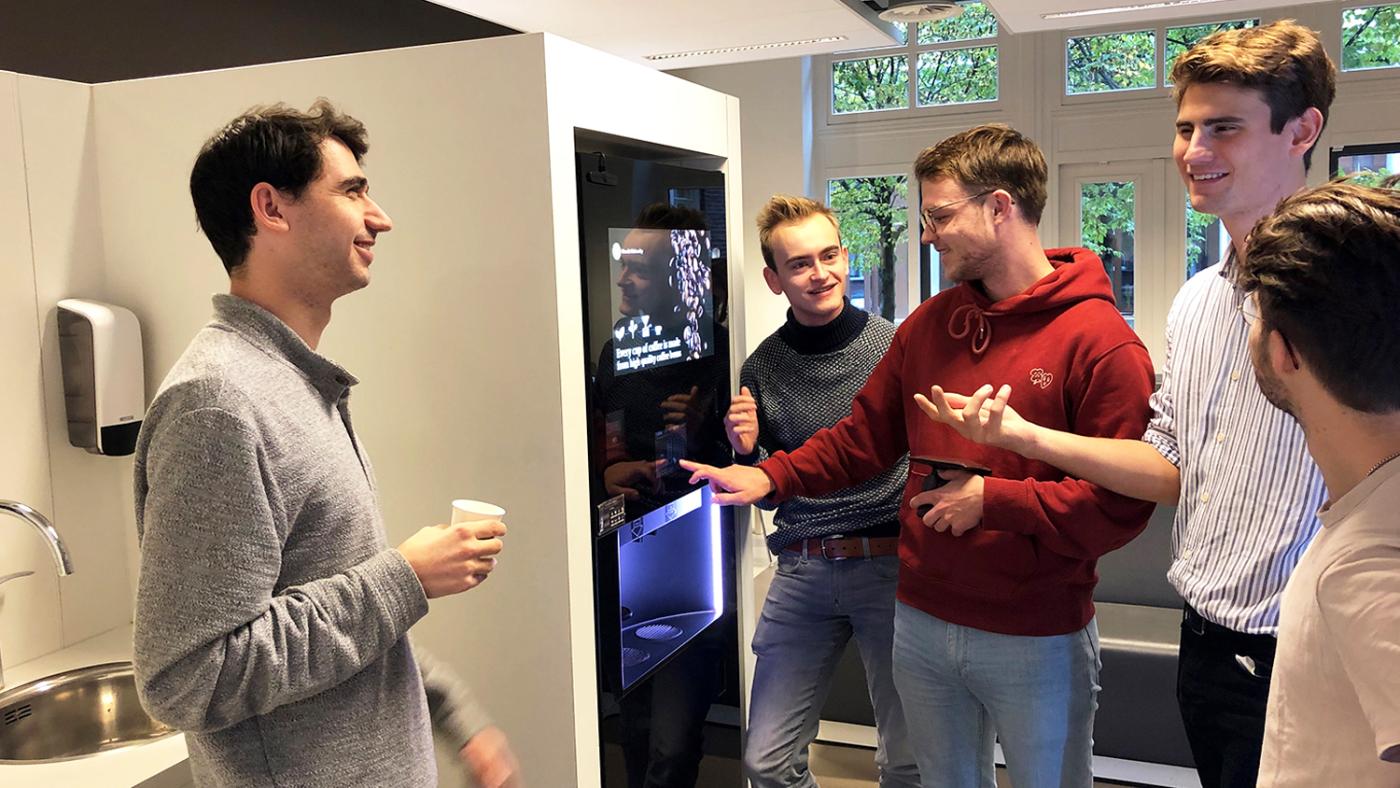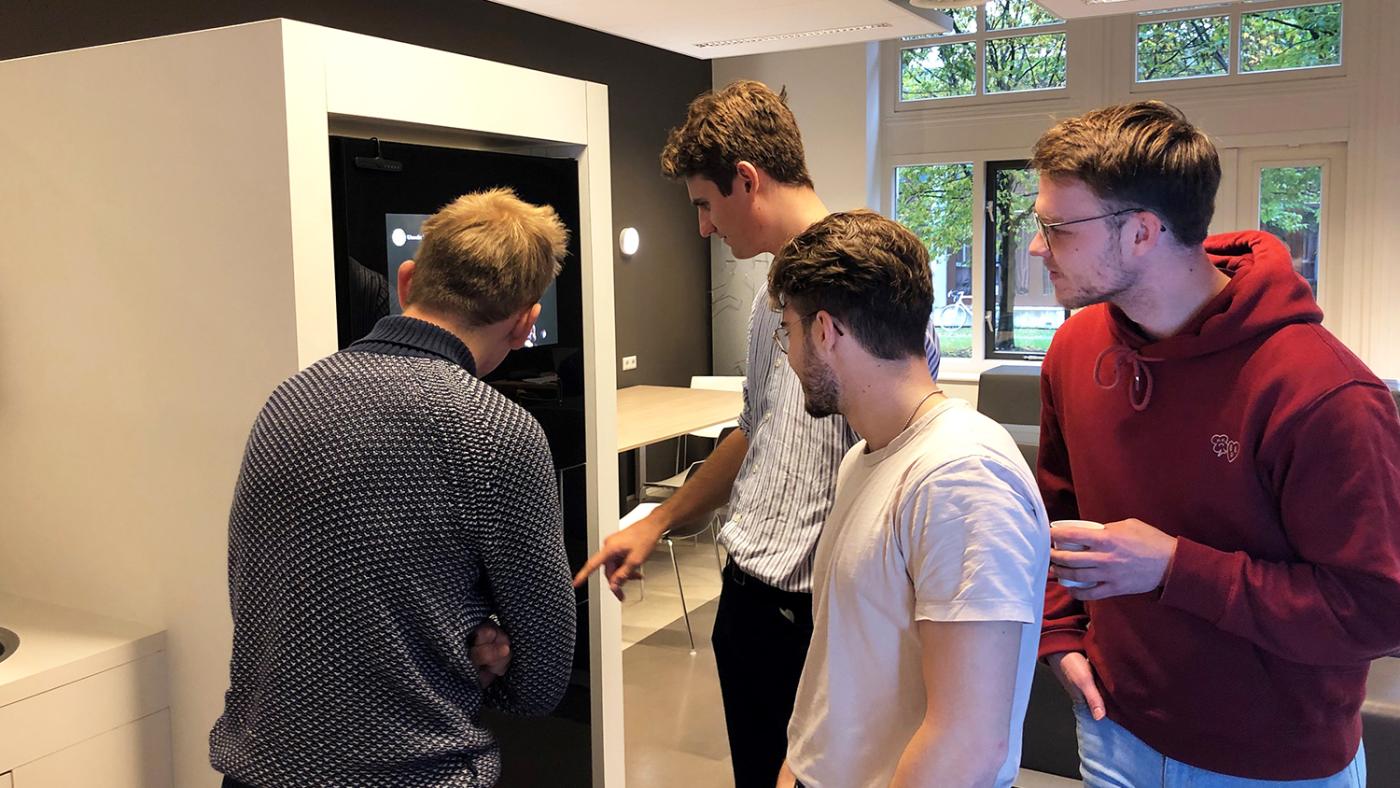Prices vary among coffee machines
What’s going on with coffee prices at UU?

Monday morning, 8:57 am, just in time for the first class of the day, and just enough wiggle room to get a much cup of coffee. Without thinking about it, I put my debit card against the machine’s reader and I see that I’m paying 1.30 euros for a cuppa. I'm taken aback. Back when I started my studies, a cup of coffee was a lot cheaper.
The price of coffee has been a regular topic of conversation around UU's coffee machines recently. A questionnaire conducted by Cursur, the magazine from the Eindhoven University of Technology, shows that UU has the second most expensive cappuccino out of all universities in the Netherlands, only behind the University of Nijmegen. Now, not only have prices gone up again but prices also vary depending on which building the machine is at. What’s going on?
Inflation or usury?
Only two years ago, the concept of inflation was rather abstract for most students. It was a reminder of economics classes in high school that they hadn't paid much attention to. But now things have changed, as prices have gone up considerably. In 2022, the inflation rate was at 10 percent. Suddenly, it was common for a beer to cost 3.50 euros at a terrace.
The effects of inflation are noticeable at university as well: tuition feed have gone up, snacks from the vending machines have gotten more expensive, and coffee costs more too. But, about the latter, is the increase justifiable due to inflation, or is there something else going on?
Calculate
For this investigation, I’ll compare the cost of a fresh cup of bean coffee from UU's machines, without a reusable cup, taking inflation into account. At the time of writing, most machines were selling coffee for 1.30 euros. So, let's take a look at coffee prices since September 2017, when the university started working with its current supplier.
We'll be using two standards to calculate inflation: First, the general inflation for food and beverages, known as the CPI index, and the specific inflation on coffee. Together, these two indexes paint a picture of the costs the supplier has to incur for providing the product. If coffee prices were to follow inflation exactly, their lines would mirror each other.
We've figured out past prices based on bank statements. In September 2017, a cup of coffee from a UU machine cost 1 euro. When we compare this price increase to inflation, it looks like a steady increase (see graph). It’s a little higher in the most recent price increase (7 percent higher than can be expected based on inflation alone), but in general, the prices match nicely with the inflation.
Inflation and VAT taxes
Merijn Smelt from the Facilities Service Centre says it is important for the university that a standard cup of coffee or tea is affordable for the average student. “That’s why we've agreed in the tender, which took place in 2016-2017, that Maas would provide coffee and tea options for 50 cents. But the company can also offer other products in the machines, like the one you’re looking at, which costs 1.30 euros. The prices are indexed every year (adjusted for inflation, Ed.), which is why they have gone up somewhat in the past few years.”
The Value Added Tax (VAT) also went up from 6 to 9 percent in 2019, which explains the more pronounced price increase that year, Smelt explains. "Since we agreed with the vendor that we'd round prices to five whole cents, prices are not adjusted in some years, but then they make a bigger jump in the next.” The coffee price should then move along with the inflation and, based on the data presented here, that seems to be the case.
Price differences between machines
Apart from the higher prices, there is another thing catching people's eye: prices differ across UU (at the time of writing). At Drift, a cup of tea costs 80 cents, but a few metres away, at Janskerkhof, the same cup of tea costs 65 cents. A cup of coffee costs 1.30 euros at University College Utrecht but 1.45 euros in most machines at Drift (oddly, the attic on Drift 21 sells coffee for 1.30 euros). If coffee does cost 1.45 euros, it’s 22 cents more than what could be expected based on general inflation.
UU also has machines that offer plant-based milk, which costs 15 cents extra in some of the machines, such as the one at UCU and on Kromme Nieuwegracht, where regular coffee costs 1.30 euros, but the plant-based milk machine right next to the regular coffee machine charges 1.45 euros. Remarkably, a cup of tea from the regular machine costs 65 cents at UCU, while tea from the plant-based machine next to it costs 80 cents. Tea is vegan in both machines.
The Drift machines have no price difference (with the exception of the one at Drift 21's attic): they all charge 1.45 euros for a cup of coffee. At Utrecht Science Park, in both the Minnaert and the Koningsberger buildings, plant-based milk options cost as much as coffee with cow’s milk: 1.30 euros.
This difference among machines, with extra charges for plant-based milk, is remarkable. When the new machines were installed this past summer, the university promised that there would be no surcharge.

Discounts vary when using one's own cup
Another thing that varies, at the time of writing, is the discount you get when you have your own reusable cup. Both machines charge 1.20 euros if you bring your own cup. That means it’s a 10-cent discount for the 1.30 euro machines, but a 25-cent discount for the ones that charge 1.45 euros. This summer, the university stated that the discount for using your own cup would be 25 cents. This is apparently only true for the machines that charge the highest prices.
Merijn Smelt aggrees that this is odd. “Beverages should cost the same in all machines, and there’s no surcharge for the plant-based milk beverages. This past summer, the cost of a disposable cup was increased from 10 to 25 cents. It seems as though that hasn’t been implemented in all machines. A cup of tea, chocolate milk, or instant coffee should cost 55 cents if you use your own cup, and the more luxurious beverage should cost 1.20 euros.”
It appears, then, that the machines that charge 1.30 euros are using the wrong price for a cup, which explains the price difference between the machines. Everyone who’s been using these cheaper machines has been receiving a 15-cent discount on their reusable cup.
“The issue with the cup prices will be solved soon,” Smelt says. “From today([November 1, 2023, ed.), machines will not offer paper cups anymore, which means the discount for reusable cups will disappear, too. It’ll take some getting used to, but in the end, it’ll be better for the environment and your wallet.”
At the cost of 1.20 euros, a cup of coffee will then be cheaper than you can expect solely based on inflation.
Kortingen verschillen bij gebruik eigen beker
Ook verschilt, op het moment van schrijven, de korting die je krijgt met een eigen beker. Bij beide automaten betaal je 1,20 euro als je een eigen beker meeneemt. Dit is bij een automaat dat een prijs van 1,30 euro hanteert dus 10 cent, en bij een automaat met een prijs van 1,45, 25 euro cent. De universiteit heeft afgelopen zomer gezegd dat de korting voor een eigen beker 25 cent zou zijn. Dit blijkt uit het onderzoek dus alleen het geval bij automaten die de hogere prijs rekenen.
Raar, zegt ook Merijn Smelt. “Prijzen van consumpties moeten in alle automaten dezelfde zijn, en er geldt geen toeslag voor de automaten met plantaardige consumpties. Afgelopen zomer is de prijs voor een beker verhoogd, van 10 naar 25 cent. Het lijkt erop dat dit niet bij alle automaten is doorgevoerd. Een kop thee, chocolademelk of instantkoffie hoort met eigen beker 55 cent te kosten, en de luxere consumpties 1,20 euro.”
Het blijkt dus dat de automaten met een prijs van 1,30 euro een verkeerde prijs voor de beker hanteerden, dit verklaart het prijsverschil tussen de automaten. Iedereen die gebruik maakte van deze goedkopere automaten heeft dus steeds 15 cent korting op de beker gekregen.
“Dit probleem met die bekerprijs wordt trouwens snel opgelost”, zegt Smelt. “Vanaf vandaag [1 november 2023, red.] komen er in principe geen kartonnen bekers meer uit de automaat en vervalt de opslag voor de beker dus ook. Even wennen natuurlijk, maar uiteindelijk beter voor het milieu en je portemonnee.”
Met de prijs van 1,20 euro die je dan betaalt, kom je lager uit dan de prijzen die je op basis van de inflatie kunt verwachten.
Lees ook onze update: Opnieuw iets raars met de koffieautomaten van de UU